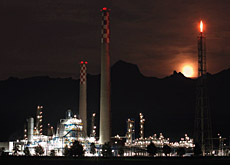
Overheating oil prices set to cool economy

Swiss consumers and the economy are expected to feel the heat from rising oil prices, as crude reached record levels in New York this week.
Experts are warning that Switzerland’s economy will suffer and growth will be hindered if the cost of oil does not drop.
On Thursday a barrel of crude briefly crossed the $60 (SFr77) threshold in New York, establishing a new record. Trading closed at $59.42.
North Sea Brent crude oil, usually considered the most expensive, closed earlier this week in London at over $58 a barrel.
Analysts say hedge funds and other speculators are betting on global demand – and therefore prices – continuing to rise. Increased production of crude has so far failed to stem price increases.
“The problem isn’t that there isn’t enough oil, but there aren’t enough refineries to respond to demand,” said Philippe Cordonier, spokesman for the Swiss petrol suppliers’ association.
A lack of refining capacity means that finished products such as unleaded fuel, diesel, kerosene and heating oil are in short supply. A rising dollar has also hit Swiss consumers since oil prices are denominated in the US currency.
Switzerland has only two refineries, both in the western part of the country, which cover a third of the nation’s fuel consumption. The rest is imported.
“These two refineries have been there for over 40 years, and there have never been any plans to build a third one,” Cordonier told swissinfo. “And even if we had it, it wouldn’t make a difference as far as prices are concerned.”
The petrol suppliers’ association expects prices to keep on climbing, as do petrol companies. “The situation doesn’t look good ahead of the summer holidays, when there is a big demand for kerosene and petrol,” said BP spokeswoman Isabelle Thommen.
Economic impact
Consumers have been feeling the effects, with fuel prices rising at the pump. They can expect to take another hit when they fill up their heating-oil tanks for the winter.
The cost of heating oil has not dropped as it usually does when the weather gets warmer. Prices have remained high and nearly two-thirds of tanks in Switzerland are still empty.
With the Swiss forced to spend more on their fuel bills, economists say consumers will be dissuaded from going out and spending on other items. This will further slow an economy that has been sluggish in recent years.
“We can expect growth to be less than originally forecast,” said Délia Nilles, an economist at Lausanne University.
Research carried out by private bank Lombard Odier Darier Hentsch shows that if the cost of a barrel of crude falls below $40, the Swiss Gross Domestic Product should increase by 1.2 per cent next year. But if it remains between $55 and $60, growth will be less than one per cent.
Valérie Lemaigre, an analyst at the bank, said she believed the price hike was only temporary and the cost of oil should fall, although this would depend on the state of the American economy and weather conditions.
If there is a heatwave this summer, oil prices will be influenced by demand for power for air-conditioning systems and refrigeration units.
swissinfo with agencies
Last year, oil production grew 3.3%, refining capacities 0.4% and demand rose 3.2%.
Growth in the oil industry in 2004 responded to demand mostly from Asia.
The record prices paid for oil and rising demand do not mean supplies are dwindling according to producers.
The biggest oil consumers are the United States, China and Japan.

In compliance with the JTI standards
More: SWI swissinfo.ch certified by the Journalism Trust Initiative



























You can find an overview of ongoing debates with our journalists here . Please join us!
If you want to start a conversation about a topic raised in this article or want to report factual errors, email us at english@swissinfo.ch.